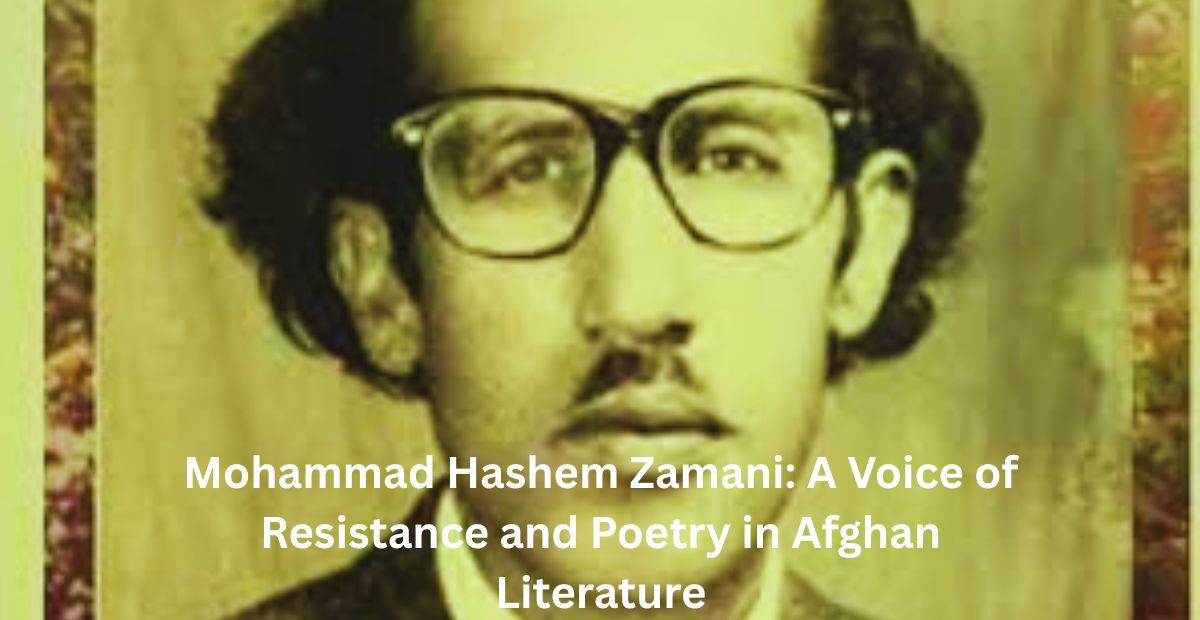Mohammad Hashem Zamani (Pashto: محمد هاشم زماني), born in 1928 in the village of Lamattak, Kunar Province, Afghanistan, was not just a poet—he was a symbol of resilience, patriotism, and literary brilliance. Through poetry born in the darkest of places, Zamani gave voice to the pain of political oppression, exile, and the undying hope for Afghan freedom.
Early Life and Political Imprisonment
Mohammad Hashem was born into a prominent family. His father, Ghazi Mir Zaman Khan, was a decorated general and a hero of the Third Anglo-Afghan War during King Amanullah Khan’s reign. But Hashem’s early life took a tragic turn at the age of 16 when he, along with over 100 family members, was imprisoned in Kabul’s notorious Deh Mazang prison. The imprisonment, labeled as “political,” lasted for an unimaginable 13 years.
During this time, Hashem bore witness to the deaths of 28 family members due to harsh prison conditions, disease, and malnutrition. However, it was within the confines of this prison that his poetic journey began, influenced by revolutionary figures like Yaqub Khan Ghond Mashar and Ghulam Nabi Khan Charkhi.
Life After Prison and Continued Struggles
Upon release, Zamani and his remaining family were exiled to Herat, where they spent eight more years under surveillance and limited freedom. Despite this, he remained politically active and represented the people of Kunar at the Grand Assembly held under President Mohammed Daoud Khan.
With the Soviet invasion of Afghanistan in 1979, Hashem sought refuge in Peshawar, Pakistan. His time in exile did not silence him; instead, it amplified his voice. He attended various international conferences and shared the plight of Afghanistan with the world.
In 1987, he migrated to the United States and settled in the Bay Area of San Francisco, continuing to write and advocate for Afghan freedom.
Health Struggles and Literary Legacy
Even after suffering a severe stroke in 1990, which left him partially paralyzed, Zamani’s passion for writing never waned. He continued to write until the final night of his life, working on the second volume of Da Pohenay Inqilab (The Revolution of Consciousness), a work that reflects his intellectual depth and unwavering spirit.
He passed away on June 10, 2005, in Hayward, California, at the age of 76 due to a heart attack. Honoring his wishes, his body was returned to his homeland and laid to rest in Kunar.
Contributions to Pashto and Afghan Literature
Zamani’s poetry was first published under the title Zendani Ehsaas (The Emotion of Prison), capturing the emotional and physical struggles he endured. His work frequently appeared in prominent Afghan publications such as Anees, Hewad, Islah, Wranga, Sistan, Tolo-i-Afghan, Baidaar, and Etifaqi-Islam.
One of his most notable works, Qutbi Khers (Polar Bear), focused on the Soviet-Afghan War and has been translated into English, with excerpts also available in French, Italian, and Spanish.
Published Works by Mohammad Hashem Zamani:
- Zendani Ehsaas (زندانى احساس) – The Emotion of Prison
- Zendani Khaterat (زنداني خاطرات) – Prison Memories
- Qutbi Khirs (قطبي خرس) – Polar Bear
- Loya Qurbani (لويه قرباني) – The Great Sacrifice
- Sarey Khwara Bala (سړي خوړه بلا) – The Man-Eating Monster
- Loya Qurbani 2 Took (لويه قرباني ٢ ټوک)
- Khwara Golona (خواره گلونه) – Scattered Flowers
- De Azadi Armaan (دآزادۍ آرمان) – The Dream of Freedom
- Rosey Khamaar (روسي ښامار) – The Russian Serpent
- Zakhmey Zra (زخمي زړه) – The Injured Heart
A Lasting Legacy
Mohammad Hashem Zamani stands among Afghanistan’s most important literary and patriotic figures. His work represents the voice of the oppressed, the resilience of the Afghan people, and the spirit of intellectual resistance against tyranny.
His poetry continues to inspire generations of Afghans, both within the country and across the diaspora. In every verse, his pain, passion, and dreams for a free and conscious Afghanistan live on.
